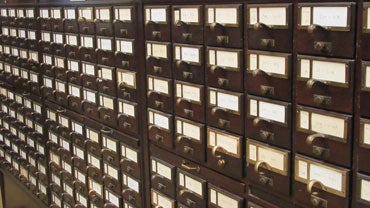
The Library’s Technical Services Department is collaborating with colleagues at other local university libraries on a project to modernize the way books and other materials are described and found in HoyaSearch and other library catalogs. While the project is taking place behind the scenes, it’s an absolutely essential project to ensure that library resources can continue to be found as our language evolves.
Specifically, Georgetown librarians are working with the Washington Research Library Consortium subgroup on reparative cataloging standards to identify and make changes to outdated and potentially harmful and offensive language that was used previously as catalog subject headings.
A library catalog may seem straightforward, but it actually requires a tremendous amount of labor, data, and revision to produce and maintain. Subject headings (or descriptors) and corresponding classification numbers are usually developed by the Library of Congress. These descriptors are one of the primary engines that make a library catalog run. They provide a single word or phrase for the primary topic or topics of a book. These topical descriptors are also used to determine how books are classified, or assigned a call number for shelving, so that books that discuss the same general topic can be grouped together for easy finding.
Like most libraries, Georgetown’s catalog primarily makes use of the Library of Congress subject headings. Even though these headings have been continually reviewed and updated since LC first published them in 1898, many still need to be changed. “Frankly, the Library of Congress can take a while to react to new trends and create new headings—a subject has to ‘blow up’ enough for them to make changes,” observes Metadata Librarian Jenny Lobb.
“There are quite a few standard subject headings that can be racist or offensive in some way,” adds Metadata Services Unit Head Asheleigh Folsom. The WRLC subgroup on reparative cataloging standards is working to develop updated subject headings that meet its member libraries’ needs.
Much of this work aligns with the Library’s efforts to build more diverse collections, provide resources on diversity, equity, and inclusion, and become a more welcoming physical and virtual environment to all users. And the work is also making catalog records more accurate and universal. “A lot of cataloging is based on the country of origin that created the code,” Lobb observed. For example, the subject heading “Italian Americans” may make sense if you’re only considering a United States’ perspective. But it is not a description commonly used by people from other countries.
Project partners are currently identifying potentially offensive subject headings for editing, as well as creating a soon-to-be-implemented Google form to allow Library users to submit their own suggestions for change.”No one knows everything, so we’re hoping to have people tell us when they see issues,” Folsom said. “If people encounter offensive descriptive terminology in the records that they find, we don’t want them to turn away—we want them to notify us so that the language can be rectified.”
